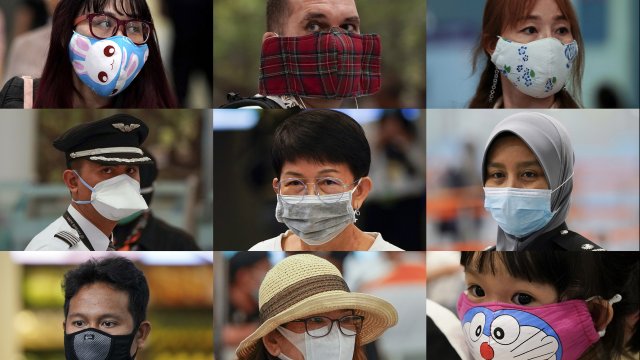As coronavirus has quickly spread across the world, so too has the use of face masks.
But whether masks were effective at stopping the spread of COVID-19 was widely debated. While most public health experts agreed that mask use helps to protect health care workers and prevents sick people from infecting others, opinions diverged over broader, community-use.
For months, the guidance from the World Health Organization and the U.S. Centers of Disease Control stated healthy people did not need to wear masks unless they were caring for someone who was sick with COVID-19.
But what experts know about the virus and how it can be transmitted has been changing — and the thinking on masks has changed with it.
Concerns have grown over emerging research about how easily the SARS-CoV-2 spreads. Some studies have found that people could be infectious for days before they show symptoms and it can be spread just by breathing.
So just how much will masks help to stop the spread of the disease?
In laboratory experiments related to the flu, researchers have found that surgical masks have been very effective at reducing the number of viral influenza particles a sick person can spread.
Recent research published in Nature in early April confirms this earlier evidence and expands upon it, finding that surgical masks were also effective when worn by sick people to reduce the emission of particles of many other viruses linked to the common cold.
"The implications for coronavirus are that if the mask was working in people with flu or with seasonal coronavirus, most likely it would also do some good if people who are sick with COVID-19 wear the mask," said Ben Cowling, who led the study and is a professor of public health at Hong Kong University.
"It wouldn't necessarily catch everything, but it's better to at least catch something than not catch anything. So the mask was doing good."
At the community level, there still isn't much conclusive evidence that masks effectively stop the spread of infection. Even as a proponent of masks, Cowling estimates that wearing a mask would only reduce an individual's likelihood of infection by a few percentage points. But in the aggregate, along with other measures like hand hygiene, staying at home and canceling mass gatherings, it could help to flatten the curve.
"I don't think we can rely on masks to keep us safe, but I think they can play a role along with all the other measures that we're thinking about doing," he said. "Five percent fewer infections, five percent fewer hospitalizations can make a massive difference … particularly when an epidemic comes towards a peak."
Public health officials have hesitated to promote broader mask use, in part because there is national shortage of medical-grade masks.
In March, Health and Human Services Secretary Alex Azar estimated that health care systems in the US would need 3.5 billion masks during a pandemic -- a fraction of the 42 million masks that were in the Strategic National Stockpile. If every person in the U.S. were to wear one mask each day, we'd need a supply nearing 10 billion for just one month.
So while guidance on wearing masks may shift, public health professionals still advise that medical grade masks be reserved for those most in need.
"Masks are extremely important for health care workers, and also critical for people with symptoms or those caring for someone sick, " Dr. Tom Frieden, the president and CEO of Resolve to Save Lives and former head of the Centers for Disease Control and Prevention, told Newsy.
"There is some evidence that wearing a mask may protect people against exposure and helps with the unknowingly asymptomatic, but [it] can also give people a false sense of security, may lead to more face touching, can become contaminated, and could be taking life-saving equipment away from health care workers.”
When surgical masks are unavailable, a scarf or bandana can be used as a last resort. But more importantly, Frieden urges sick people to just stay home.
"If you're sick, don't go out. Don't expose others. Even if you're only mildly sick, your illness may kill somebody else."


